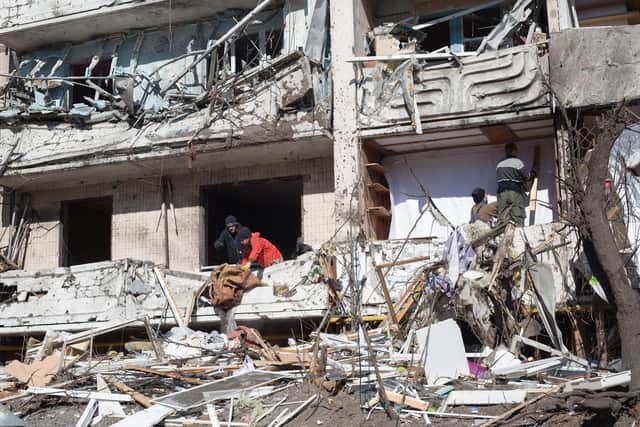Ukraine-Russia: 'We are a freedom-loving people, but we are fighting back in this information war', says Ukrainian journalist
“My whole life was spent in peaceful Kyiv. Kindergarten, school, university, first job – this city gave me everything I could dream of. Today it is fired at with rockets, and saboteurs with weapons roam the streets.
The occupiers are shelling civilian homes, schools, hospitals and maternity hospitals. Children are buried under the rubble. Women have to give birth in bomb shelters, with great risks, to the sound of shelling. What the occupiers did to Mariupol – they bombed the maternity hospital – we will never forgive.
Advertisement
Hide AdAdvertisement
Hide AdThis hell came into our lives on the morning of February 24. And from that moment, a new countdown began. So today is the 20th day since the beginning of the Russian invasion in Ukraine.


On the first day, when I was fast asleep in my bed, at 5:30am my phone rang and a friend’s voice sounded: “Nastya, pack up, the war has begun.”
Waking up, I thought it was a joke. I opened Facebook. It was no joke. Russian troops had attacked a military unit in Brovary. Brovary is a city near Kyiv, around the same distance from the capital as Edinburgh to North Berwick. All the inhabitants of the left bank of Kyiv woke up because of this sound.
Then I started to quickly pack my things, because I hadn’t prepared my “anxiety suitcase”, which everyone had been talking about for about a month. I did not believe that I would have to use it. I grabbed only warm things, my prescription glasses, mobile phone chargers and documents. At the same time, I called my parents and woke them up. They agreed to meet at a country house outside Kyiv and then decide what to do.
The journey, which usually takes 40 minutes, stretched to six hours. Crowded gas stations, scared people walking with suitcases, it was like some kind of apocalypse.


When I arrived at the country house, it was quiet, the forest was nearby as usual, as if nothing had happened. Mum and Dad were next door, I felt already calmer. But every ten minutes, fighter planes flew very low with a terrible roar, because there is a military airport nearby. The realisation came to me the world will never be the same again.
I had to leave my parents there, say goodbye to them and go back to Kyiv to pick up friends.
Seeing them cry hurt the most. A family with a pregnant woman and a child had to be evacuated to Western Ukraine and I drove them. We drove 12 hours to our first stop, but only managed to drive 300km from Kyiv. Queues at checkpoints, car accidents – everything was there. The child was tired and was crying, constantly saying he wanted to go home.
We could not find the words. And just drove in silence.
Advertisement
Hide AdAdvertisement
Hide AdAll the hotels and apartments were already occupied, but there was a curfew, and we had to get to a point where we could eat and sleep. Air raid sirens sounded in some cities, but the cars kept going and we followed them. I turned on the music louder so I wouldn’t hear the sirens. We stayed with good people in Vinnytsia region, who fed us at night and welcomed us. And in the morning, in that city, the air raid alarm began. We had to go further.
The road to Transcarpathia was even more difficult. It was 18 hours behind the wheel, without any contact with relatives. A military airport and an oil depot were bombed near my parents’ house. I held back tears to stay focused on the road. My hands were shaking.
Columns of military equipment, which we had seen only at military parades, passed by.
The pregnant woman who I drove to safety was forced to separate from her husband because he had to return to work at a critical government facility.
I made my way to London alone. I was on the road for 24 hours, falling asleep in a traffic jam at the border. People with small children got out of cars and walked across the border. Locals distributed sandwiches and water, tea for refugees. After crossing the border with Hungary, I reached Slovakia, leaving the car there.
I don’t remember flying in the aeroplane, because the whole flight was like in a fog.
Feelings of guilt that I was safe, and my family was still there, in the centre of hell, began to devour me. So I decided to start working on the “western” front, in the information war.
Every day Russia proves rules of the game no longer exist. Russian aircraft use incendiary bombs, which are expressly prohibited by international law.
Advertisement
Hide AdAdvertisement
Hide AdThey are shelling roads that were previously agreed upon as a “green corridor” for the evacuation of civilians. People in Mariupol and Kharkiv are left without heat, food and water, without contact with their relatives. All those who remain in Ukraine live daily in fear that Russia will use deadly chemical and biological weapons.
Every night I wake up from the horrors, check the news and talk to my family. This is our new reality. Western partners hope that we will go to peace on any terms. However, we are not going to follow Vladimir Putin’s whims. The Armed Forces of Ukraine and the Ukrainian people are now showing such resistance that no other country in Europe has shown in modern history. We are a freedom-loving people. Our nation is ready to die for its European choice, but to defend its values.
The West needs to understand one thing – Putin has completely lost his mind. And he won’t stop.
We do not need words of support and statements. We need military equipment, anti-aircraft systems and the support of Nato’s army.”
A message from the Editor:
Thank you for reading this article. We're more reliant on your support than ever as the shift in consumer habits brought about by Coronavirus impacts our advertisers.
If you haven't already, please consider supporting our trusted, fact-checked journalism by taking out a digital subscription.
Comments
Want to join the conversation? Please or to comment on this article.
